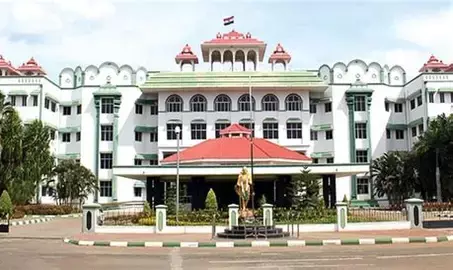- Home
- /
- High Courts
- /
- Madras High Court
- /
- Husband, Children Have Legal And...
Husband, Children Have Legal And Moral Duty To Maintain Wife/Mother: Madras High Court
Upasana Sajeev
25 Sept 2025 9:50 PM IST
The Madras High Court recently upheld the order of a Family Court in Madurai asking a husband and his sons to pay Rs. 21,000 as monthly maintenance for their wife/mother. Justice Shamim Ahmed remarked that a man had a legal and moral duty to maintain his mother/wife during her lifetime, and this duty was to ensure that the mother/wife is supported and cared for during their old...
The Madras High Court recently upheld the order of a Family Court in Madurai asking a husband and his sons to pay Rs. 21,000 as monthly maintenance for their wife/mother.
Justice Shamim Ahmed remarked that a man had a legal and moral duty to maintain his mother/wife during her lifetime, and this duty was to ensure that the mother/wife is supported and cared for during their old age.
“It is a well-established principle that it is a man's legal and moral duty to maintain his mother/wife during her life time. This responsibility stems from the inherent obligation of children to care for their parents. Similarly, it is the duty of the husband and children to provide for the wife and mother during her old age, ensuring she is supported and cared for,” the court said.
The court also added that by fulfilling this duty, the individual was demonstrating respect and gratitude towards their mother who had devoted herself to nurture and care for the family. The court called this a fundamental aspect of familial responsibility and remarked that it allowed the mothers to live their later years with dignity and care.
“By fulfilling this duty, individuals demonstrate respect, gratitude, and compassion towards their mothers, who have devoted themselves to nurturing and caring for their families. Ultimately, showing favour to one's mother and prioritizing her well-being in old age is a fundamental aspect of familial responsibility and societal values. By fulfilling this duty, individuals can ensure their mothers live their later years with dignity and care,” the court remarked.
The court was hearing the revision petitions filed by the husband and his two sons, asking them to pay a monthly maintenance of Rs 21,000 to the wife/mother.
The petitioners submitted that the marriage between the husband and wife was solemnised in 1986, and in 2015, the mother had voluntarily left the matrimonial home. The petitioners further submitted that the husband is now 60 years old and is suffering from health issues and is resting at home without any source of income. It was submitted that one son was struggling to manage the expenses, including those of his father, and taking care of his own family, including his wife and children. it was further submitted that the second son, who was working in Bangalore, was also in a poor financial state and often required financial support from his brother.
The petitioners further submitted that the wife/mother was having sufficient means to maintain herself, which was proved from her ability to maintain a car for herself and employ a driver. It was also submitted that the petitioners were willing to take care of the wife/mother but the Family Court had failed to consider the facts and evidence on record properly.
The court, however, opined that the husband and the sons had a social responsibility to maintain the wife and mother, as the invaluable role played the mother could not be compensated. The court added that no amount to payment could ever bear the pain and sacrifice that was endured by the mother at the time of childbirth.
“It is the social responsibility of the husband and sons to maintain their wife and mother, as the invaluable role and care of a mother cannot be compensated, no matter how much her children pay her back in a lifetime. Moreover, no amount of payment can ever bear the pain and sacrifices that a mother endured at the time of their birth,” the court said.
The court also held that the amount of Rs. 21,000 was not excessive or disproportionate given the rising prices and high cost of living.
Thus, noting that the petitioners had failed to show any impropriety or incorrectness in the order passed by the Family Court, the opined that the order did not require any interference.
Counsel for Petitioner: Mr. N. TamilMani
Case Title: RAP v. AM
Citation: 2025 LiveLaw (Mad) 325
Case NO: CRL.R.C.(MD)No.1282 of 2025



